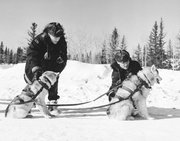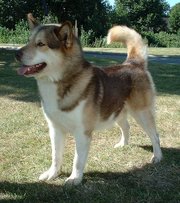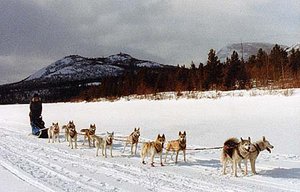Sled dog
|
|
Sled dogs, known also as sleigh dogs, sledge dogs or sleddogs are dogs that are used to pull a wheel-less vehicle on runners (a sled or sleigh) over snow or ice, by means of harnesses and lines. It is not certain when this unique form of transport was first thought of by humankind nor where it originated, but it may well have been in eastern Siberia, whose tribes have a long history of nomadic winter travel.
Several distinct dog breeds are in common use as sleddogs, although any medium-sized breed may be used to pull a sled. Purebred sleddog breeds range from the well-known Siberian Husky to rarer breeds such as the Mackenzie River husky. Dog drivers, however, have a long history of using other breeds or crossbreds as sleddogs. In the days of the Gold Rush in Alaska, mongrel teams were the rule, but there were also teams of Foxhounds and Staghounds. Today the unregistered hybridised Alaskan husky is preferred for dogsled racing, along with a variety of crossbreds, the German Shorthaired Pointer often being chosen as the basis for crossbreeding. Some years ago, a team of Standard Poodles participated in the Iditarod long-distance race.
Sleddogs are expected to demonstrate two major qualities in their work (apart from basic physical capability to pull the sled). Endurance is needed to travel the distances demanded in dogsled travel, which may be anything from five to eighty miles (8 to 240 km) or more a day. Speed is needed to travel the distance in a reasonable length of time. Racing sleddogs will travel up to an average twenty miles per hour (30 km/h) over distances up to 25 miles (40 km). Over longer distances, average travelling speed declines to 10 to 14 miles per hour (16 to 22 km/h). In poor trail conditions, sleddogs can still usually average 6 or 7 miles per hour (10 or 11 km/h).

Sleddogs pull various sorts of sleds, from the small 25 pound (11 kg) sprint-racing sleds, through the larger plastic-bottomed distance racing toboggan sleds, to traditional ash freighting sleds and the trapper's high-fronted narrow toboggan. Sleddogs are also used to pull skiers and to draw wheeled rigs when there is no snow. A team of sleddogs may consist of anywhere from three to two dozen animals. Modern teams are usually hitched in tandem, with harnessed pairs of sleddogs pulling on tuglines attached to a central gangline. Trappers in deep snow conditions using the toboggan will hitch their dogs in single file with traces on either side of the line of dogs. Dog teams of arctic natives are usually run in "fan hitch", each dog having its own tow line tied directly to the sled.
Driving sleddogs has become a popular winter recreation and sport in North America and Europe; sleddogs are now found even in such unlikely places as Australia and Patagonia.

Sled dog breeds
- Alaskan husky
- Alaskan Malamute
- Canadian Eskimo Dog (or Qimmiq)
- Chinook
- Eurohound
- Greenland Dog
- Mackenzie River husky
- Samoyed
- Seppala Siberian Sleddog
- Siberian Husky (or Arctic Husky)

